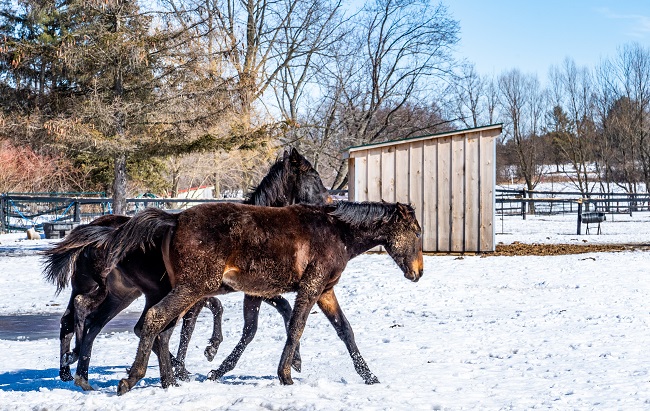
Now that the weather is cooling off prior to winter you will want to evaluate your horse’s body condition, teeth, food, and shelter. You should try to provide the best quality hay possible. Grain can be added to the feed with the amount dependent on the body condition of your animal. Animals that have a good body condition or are overweight may not require as much or any grain added during their daily feedings. Horses that are underweight can be given more grain or a variety of supplements, provided they don’t receive too much which may result in more severe health problems. Make sure that you provide your horse with plenty of fresh, clean water throughout the winter.
Impaction colics become more common this time of year when horses water intake decreases. You may want to invest in a heated water bucket or install an ice melting system in your water tanks to ensure that water is always available. Horses can be encouraged to drink by adding salt to the water or feed, or by placing a salt/mineral block in the corral. Deworming your horse on scheduled intervals throughout the year can also improve a horse’s ability to maintain weight during the winter. Internal parasites living in the digestive tract of the horse compete with the animal for the nutrients. After the first hard freeze of the year, give your horse a dewormer that will kill these parasites. You may want to consult with your veterinarian as to which product to use. We prefer to see multiple worming products rotated several times throughout the year to avoid resistance problems.
Consider having your veterinarian conduct a dental exam each fall. Horses don’t always exhibit signs of dental problems. In some cases, horses may simply lose a small amount of food that they are eating. More severe problems can arise when the horse cannot chew their food completely and it becomes lodged in their mouth or throat. During the coldest part of the year, horses need to consume all the food that they can to maintain weight. Floating a horse’s teeth can provide them with a better opportunity to consume every bit of food that you provide and prevent more serious problems from occurring.
Blankets are a tool that can help maintain a horse’s health during the cold months. Don’t blanket your horse too early as this may keep the natural winter coat of hair from developing. A natural coat is the most efficient way for your horse to keep itself warm. If you do keep your horse blanketed, make sure to remove and clean it periodically to prevent sores from developing or parasites from moving onto the horse. Read this article for more information on blanketing.
Remember that keeping your horse healthy during the winter begins ahead of time with routine veterinary care, dental exams, deworming and vaccinations. If you have additional questions regarding care for your horse, please consult your veterinarian.
This article was provided by the doctors of the Granville Veterinary Service. They can be contacted at 518.642.1676 or you can visit their website at Gvsla.com.
Related Articles & Free Email Newsletter Sign Up
6 Things to Do When You Can’t Ride Your Horse
How to Meet the Nutritional Needs of Senior Horses




Comment here